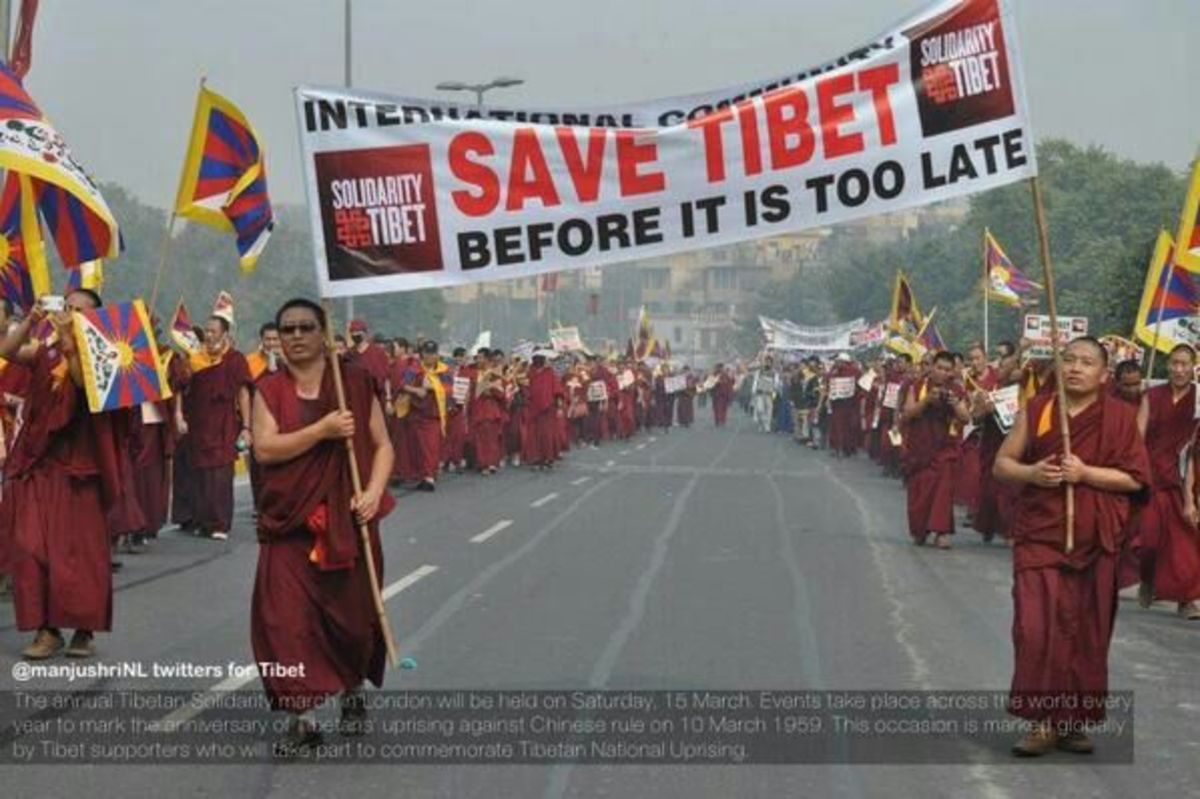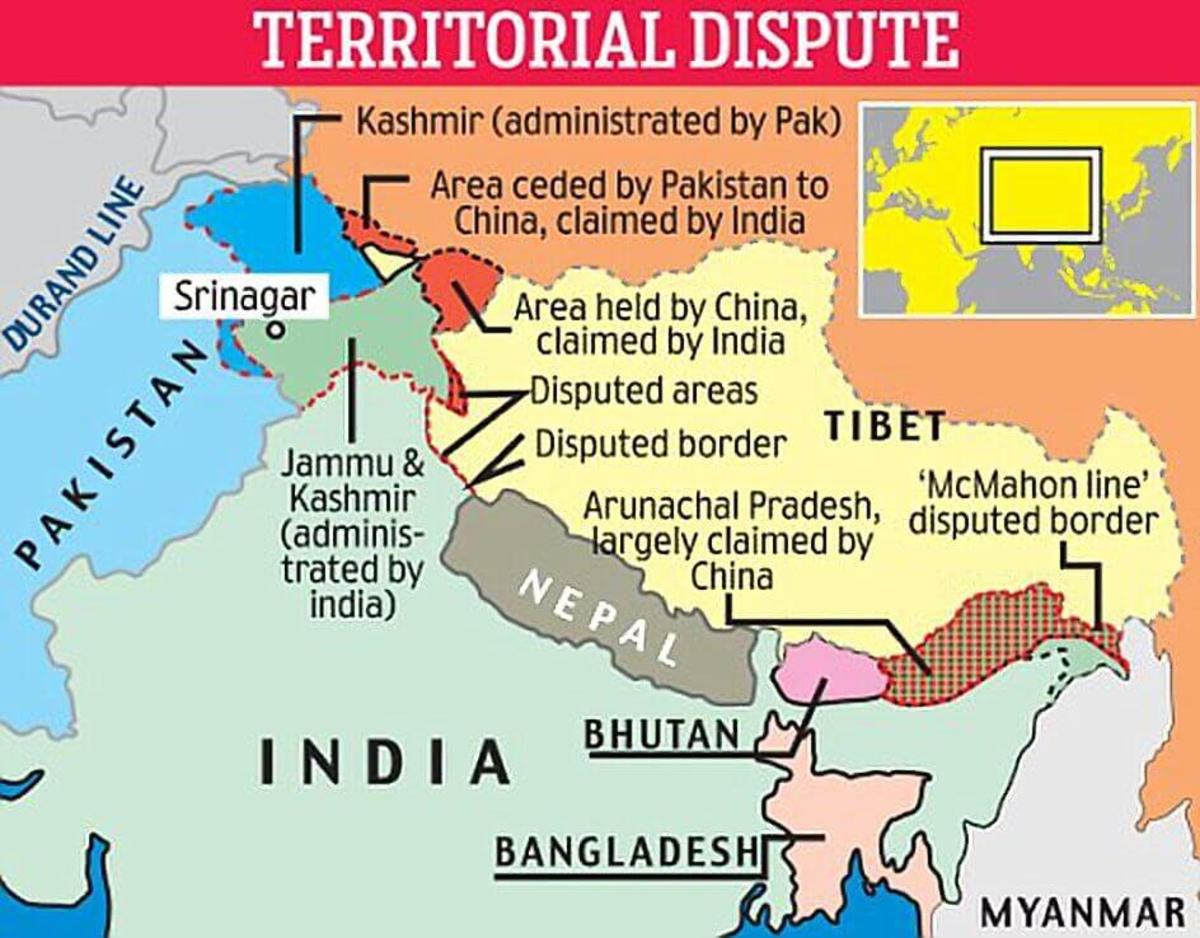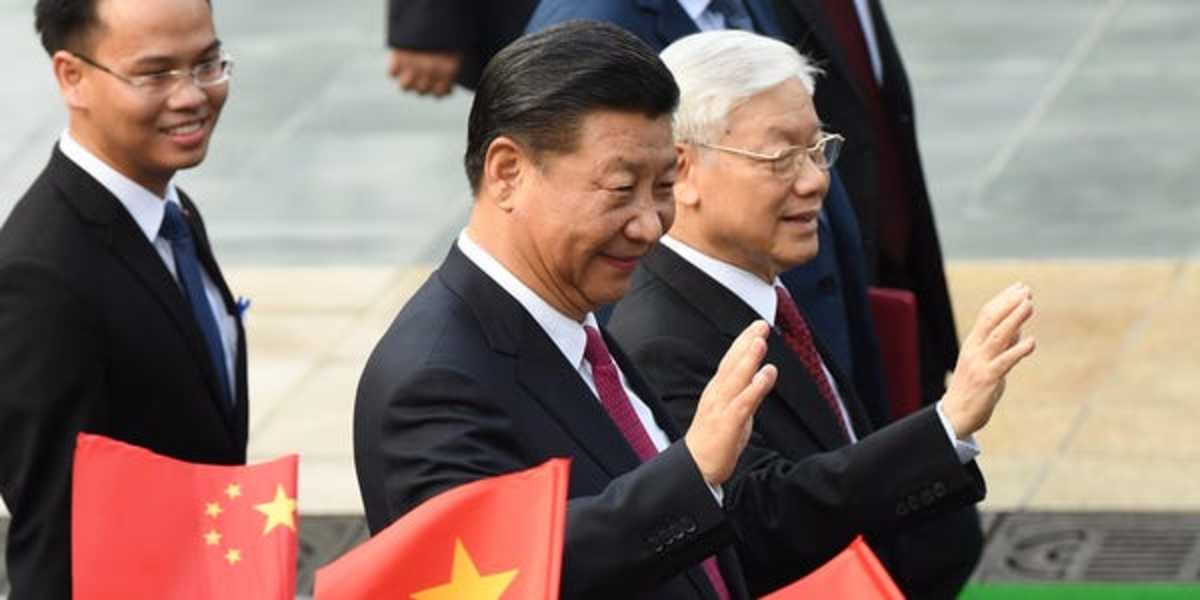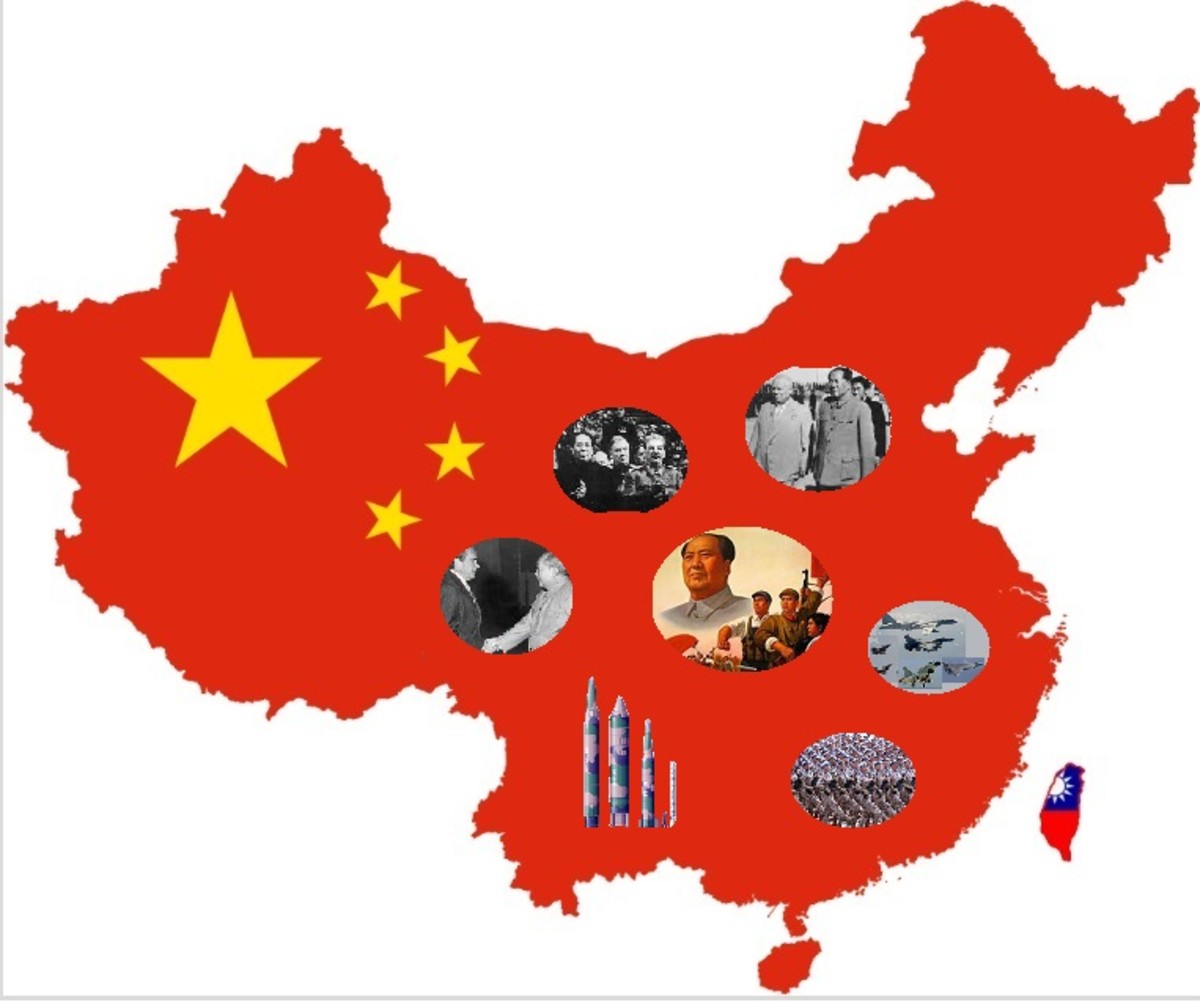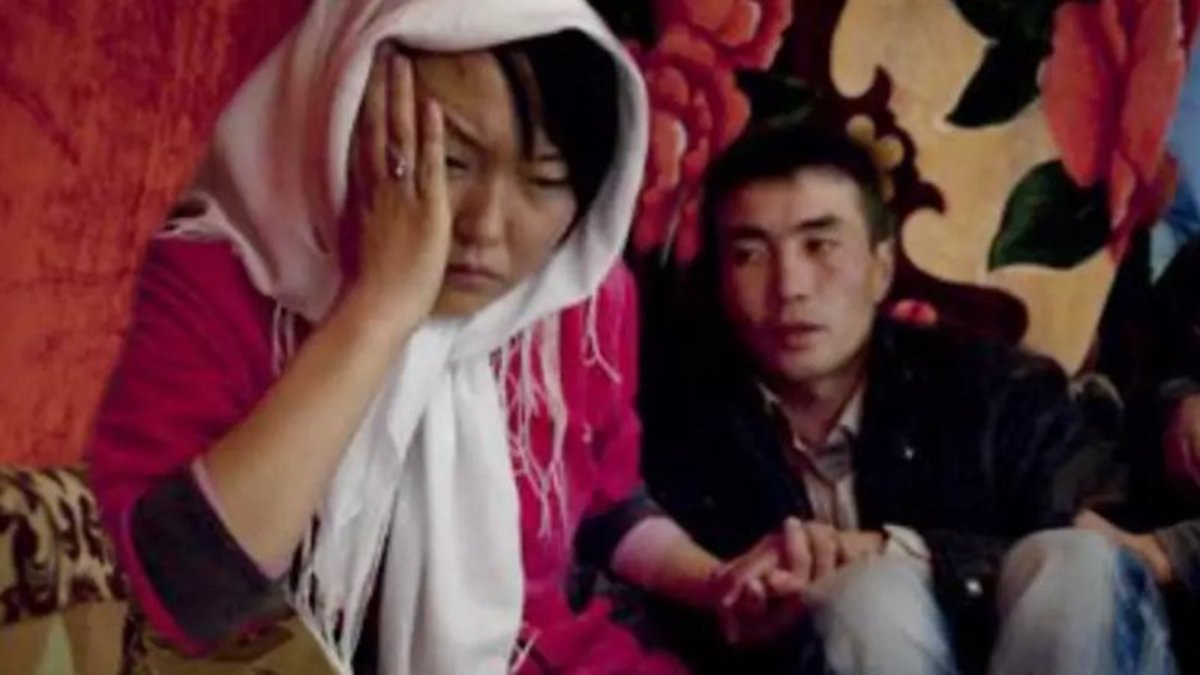Statement by HH the Dalai Lama on the 49th Anniversary of the Tibetan National Uprising
Tibetan National Uprising Day in Dharamsala, India
Little Lhasa News ~ Save Tibet!
Every year, on March 10, His Holiness the Dalai Lama, issues a statement in commemoration of the Tibetan National Uprising Day, in which the Tibetan people took a stand against the Government of the Peoples Republic of China, which has occupied Tibet with disastrous consequences. For the Tibetan people, March 10 is a mournful day, because of the huge number of casualties of the demonstration. The Tibetans are a very peaceful community, with Buddhism deeply ingrained in every aspect of life. Their ancient customs are infused with spirituality and the focus of their consciousness is to achieve enlightment in this lifetime or the next one. In this one occasion in which Tibetans took up arms, the losses were devastating.
As the temporal as well as religious leader of the Tibetan people, the Dalai Lama makes statements of a political nature as well as spiritual, and he is the head of the Tibetan Government in Exile, formed in 1959 when he exited Tibet on foot into India, encouraged by his advisors. An exodus of huge numbers took place and the people of Tibet are largely a diaspora now, with India being the country that most welcomed the Tibetan exiles.
In Tibet itself, temples and monasteries have been decimated, and the people encounter difficulties in practicing their religion. It is a capital offense there to have a photo of the Dalai Lama in one's possesion. The government of the People's Republic of China has "Disneyfied" areas of Tibetan Buddhist and Bon worship making it seem to tourists that Tibet is the "Shangri-La" of Lost Horizons. The reality is that the depth of Tibetan Buddhist philosophy and the treasures of Tibetan religious life have been reduced to droplets.
There is much to be frustrated about, and yet, the Tibetan community show their desperation peacefully. There are few examples more poignant than when Tibetan musicologist Ngawang Choepel was held for years in a Chinese prison, accused of spying when he was in Tibet on a fellowship to study the national folk melodies. His mother rendered herself homeless in front of the Chinese embassy in India to try to secure his release. It took her efforts, along with that of Amnesty International and the global community to convince the Chinese government to set him free.
Please lend the Tibetan people your support, especially at this time when the Olympics place China in the world's eye. This is an excellent time to say "No" to the oppresion of the people of Tibet.
Please help Save Tibet.
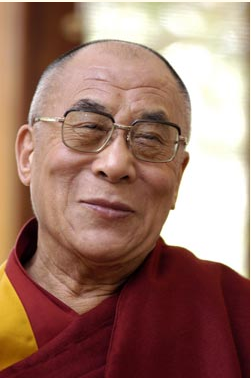
- Tibetans Mark National Uprising Day
- NBC 29: Count on Us - Tibetan National Uprising Day in the City
- March10: RISE UP : RESIST : RETURN
- Free Tibet Campaign - Uprising Day 2008
- Dalai Lama talks tough on Tibet's uprising day @ NewKerala.Com ...
- Tibetans living-in-exile rehearse for uprising day march in full ...
- March 10: Tibetan National Uprising Day | Friends of Tibet (INDIA)
The Dalai Lama's Statement
"On the occasion of the 49th anniversary of the Tibetan people’s peaceful uprising in Lhasa on 10 March 1959, I offer my prayers and pay tribute to those brave men and women of Tibet who have endured untold hardships and sacrificed their lives for the cause of the Tibetan people and express my solidarity with those Tibetans presently undergoing repression and ill-treatment. I also extend my greetings to Tibetans in and outside Tibet, supporters of the Tibetan cause and all who cherish justice.
"For nearly six decades, Tibetans in the whole of Tibet known as Cholkha-Sum (U-Tsang, Kham and Amdo) have had to live in a state of constant fear, intimidation and suspicion under Chinese repression. Nevertheless, in addition to maintaining their religious aim, a sense of nationalism and their unique culture, the Tibetan people have been able to keep alive their basic aspiration for freedom. I have great admiration for the special characteristics of the Tibetan people and their indomitable courage. I am extremely pleased and proud of them.
"Many governments, non-governmental organizations and individuals across the world, because of their interest in peace and justice, have consistently supported the cause of Tibet. Particularly during the past year, governments and peoples of many countries made important gestures that clearly expressed their support to us. I would like to express my gratitude to every one of them.
"The problem of Tibet is very complicated. It is intrinsically linked with many issues: politics, the nature of society, law, human rights, religion, culture, the identity of a people, the economy and the state of the natural environment. Consequently, a comprehensive approach must be adopted to resolve this problem that takes into account the benefits to all parties involved, rather than one party alone. Therefore, we have been firm in our commitment to a mutually beneficial policy, the Middle-Way approach, and have made sincere and persistent efforts towards achieving this for many years. Since 2002, my envoys have conducted six rounds of talks with concerned officials of the People's Republic of China to discuss relevant issues. These extensive discussions have helped to clear away some of their doubts and enabled us to explain our aspirations to them. However, on the fundamental issue, there has been no concrete result at all. And during the past few years, Tibet has witnessed increased repression and brutality. In spite of these unfortunate developments, my stand and determination to pursue the Middle-Way policy and to continue our dialogue with the Chinese government remain unchanged.
"A major concern of the People's Republic of China is its lack of legitimacy in Tibet. The principal way to lend weight to their position is for the Chinese government to pursue a policy that satisfies the Tibetan people and gains their confidence. If we are able to achieve reconciliation by treading a path of mutual consent, then, as I have already stated many times, I will make every effort to win the support of the Tibetan people.
"In Tibet today, due to the Chinese government's numerous actions, driven as they are by a lack of foresight, the natural environment has been severely damaged. And, as a result of their policy of population transfer the non-Tibetan population has increased many times, reducing native Tibetans to an insignificant minority in their own country. Moreover, the language, customs and traditions of Tibet, which reflect the true nature and identity of the Tibetan people, are gradually fading away. As a consequence, Tibetans are increasingly being assimilated into the larger Chinese population. In Tibet, repression continues to increase with numerous, unimaginable and gross violations of human rights, denial of religious freedom and the politicization of religious issues. All these take place as a result of the Chinese government's lack of respect for the Tibetan people. These are major obstacles the Chinese government deliberately puts in the way of its policy of unifying nationalities which discriminate between the Tibetan and Chinese peoples. Therefore, I urge the Chinese government to bring an immediate halt to such policies.
"Although the areas inhabited by Tibetan people are referred to by such different names as autonomous region, autonomous prefectures and autonomous counties, they are autonomous in name only; they actually have no real autonomy. Instead, they are governed by people who are oblivious of the regional situation, and driven by what Mao Zedong called "Han chauvinism". As a result, this so-called autonomy has not brought the concerned nationalities any tangible benefit. Disingenuous policies that are not in tune with reality are causing enormous harm not only to the respective nationalities, but also to the unity and stability of the Chinese nation. It is important for the Chinese government, as advised by Deng Xiaoping, to "seek truth from facts" in the real sense of the term.
"The Chinese government severely criticizes me when I raise questions about the welfare of the Tibetan people before the international community. Until we reach a mutually beneficial solution, I have a historical and moral responsibility to continue to speak out freely on their behalf. However, it is common knowledge that I have been in semi- retirement since the political leadership of the Tibetan Diaspora has been directly elected by the general Tibetan populace.
"China is emerging as a powerful country due to her great economic progress. This is to be-welcomed, but it has also provided China an opportunity to play an important role on the global stage. The world is eagerly waiting to see how the present Chinese leadership will put into effect its avowed concepts of "harmonious society" and "peaceful rise". For the realization of these concepts, economic progress alone will not suffice. There must be improvements in observance of the rule of law, transparency, and right to information, as well as freedom of speech. Since China is a country of many nationalities, they must all be given equality and freedom to protect their respective unique identities if the country is to remain stable.
"On 6 March 2008, President Hu Jintao stated: "The stability in Tibet concerns the stability of the country, and the safety in Tibet concerns the safety of the country." He added that the Chinese leadership must ensure the well-being of Tibetans, improve the work related to religions and ethnic groups, and maintain social harmony and stability. President Hu's statement conforms to reality and we look forward to its implementation.
"This year, the Chinese people are proudly and eagerly awaiting the opening of the Olympic Games. I have, from the very beginning, supported the idea that China should be granted the opportunity to host the Olympic Games. Since such international sporting events, and especially the Olympics, uphold the principles of freedom of speech, freedom of expression, equality and friendship, China should prove herself a good host by providing these freedoms. Therefore, besides sending their athletes, the international community should remind the Chinese government of these issues. I have come to know that many parliaments, individuals and non-governmental organizations around the globe are undertaking a number of activities in view of the opportunity that exists for China to make a positive change. I admire their sincerity, I would like to state emphatically that it will be very important to observe the period following the conclusion of the Games. The Olympic Games no doubt will greatly impact the minds of the Chinese people. The world should, therefore, explore ways of investing their collective energies in producing a continuous positive change inside China even after the Olympics have come to an end.
"I would like to take this opportunity to express my pride in and appreciation for the sincerity, courage and determination of the Tibetan people inside Tibet. I urge them to continue to work peacefully and within the law to ensure that all the minority nationalities of the People's Republic of China, including the Tibetan people, enjoy their legitimate rights and benefits.
"I would also like to take this opportunity to thank the Government and people of India, in particular, for their continuing and unparalleled support for Tibetan refugees and the cause of Tibet, as well as expressing my gratitude to all those governments and peoples for their continued concern for the Tibetan cause.
"With my prayers for the well-being of all sentient beings."
The Dalai Lama
10 March 2008
Michael Andrews Speaking on Behalf of Amnesty International at the University of Miami
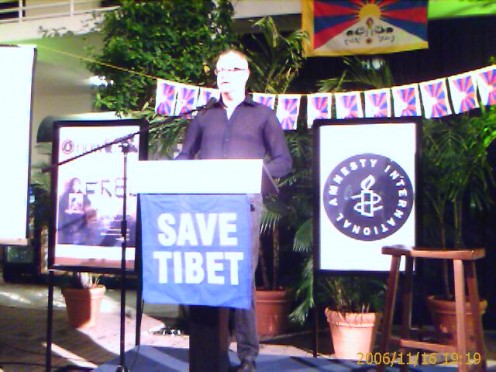
Amnesty International Condemns Harsh Crackdown on Peaceful Tibetan Protesters
(Washington, DC)--Amnesty International today condemned the harsh crackdown on peaceful protesters in the Tibetan capital, Lhasa. According to eyewitness reports, on March 11, Chinese police used teargas and electric prods to disperse 500 demonstrators, who were seeking the release of fellow monks held after the previous day's protests.
On March 10, it was reported that 11 protesters, including nine monks, were severely beaten and detained outside Tsuklakhang cathedral in central Lhasa. Their demonstrations marked the 49th anniversary of the Dalai Lama's flight from Tibet after his failed rebellion against Chinese rule. Some 50 monks have also been detained across the capital.
"Demonstrators have a right to protest peacefully. China violates international human rights standards in denying their freedom of assembly and freedom of expression," said Amnesty International's Asia-Pacific deputy program director Tim Parritt.
"Amnesty International condemns human rights abuses wherever they occur--on the streets of Beijing or the mountains of Tibet."
Amnesty International calls on China to release immediately all those detained for peacefully exercising their rights.
For more information, contact the AIUSA media office at 202-544-0200 x302.

